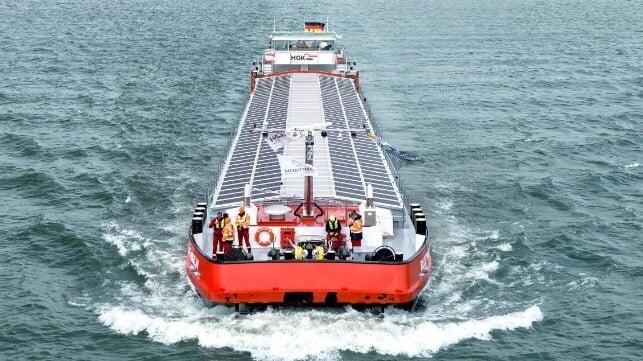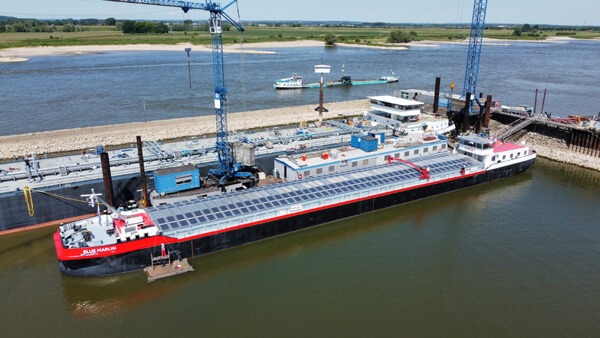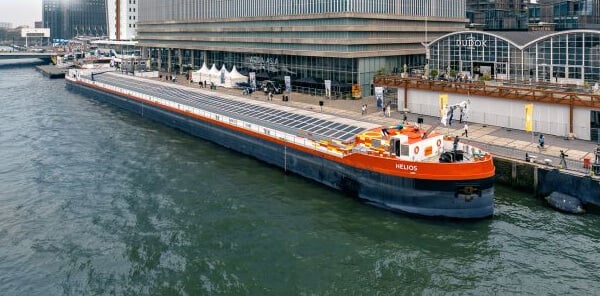First Inland Cargo Vessel Launched Capable of Sailing with Solar Power

A newly built inland dry goods vessel, Blue Marlin, was named last week in Hamburg, Germany, and became the world’s first hybrid solar-power inland shipping vessel, as well as receiving a designation for remote-controlled operations. The solar system aboard the ship advances on prior low-voltage systems that are supplying power for onboard systems and provides the first capability to contribute solar power to propulsion.
The vessel has several unique capabilities, starting with its 192 solar panels, which are expected to generate up to 37,500 kilowatt hours annually. The system developed by the Netherlands’ Wattlab is more advanced than a system deployed just a year ago and is fully integrated, giving it the capability of contributing power directly to the ship’s high-voltage electric propulsion.
Delivering up to 35 kilowatts under optimal conditions, Wattlab says the Blue Marlin’s solar power system will operate in conjunction with four diesel generators powering the electric propulsion system. This fully integrated setup enables “peak shaving,” where the combination of solar energy and batteries will prevent the need for activating an additional generator during high-demand periods. The system’s automated energy management will distribute electrical energy where and when it is required, increasing efficiency and reducing fuel consumption.
“Furthermore, in situations where the ship is lightly loaded and travelling downstream, we anticipate that it may even sail using only solar power for limited periods—an unprecedented achievement in the inland shipping sector,” said Wattlab co-founder and COO David Kester.

Blue Marlin has 192 solar panels (Wattlab)
The hull of the vessel was built in Romania at the Orsova Shipyard and outfitted in the Netherlands at De Gerlien van Tiemm. It is homeported at Cologne, Germany, and will run for HGK Shipping, a Germany-based European inland shipping company with a fleet of 350 vessels. It will be employed for the German steel company Salzgitter, mainly transporting steel and bulk materials along the network of canals in north-west Germany.
SEAFAR developed technology for the vessel to be operated remotely. After several trial voyages, the German General Directorate of Watersways and Shipping (GDWS) issued a permit for remotely controlled navigation on the canal between Salzgitter and Friedrichsfeld.
In addition to its advanced solar power capabilities, the vessel features a powerful diesel-electric, future-fuel-ready drive concept. Its dimensions (86 meters in length, 9.5 meters wide, and navigation capability with 1.1 meters of draft) were optimized for the canals. It employs two Veth rudder propellers and has a bow thruster. It can also be coupled with a push barge to transport weights up to 3,110 tonnes.
“The Blue Marlin is a strong symbol of what industry and logistics can achieve when they work in tandem,” said Florian Bleikamp, the Managing Director of HGK Dry Shipping. “As we work together, we’re able to put innovative ideas into practice: ranging from emission-free solar technology to remote-controlled navigation for the vessels and even resource-saving drive systems in our fleet.”

Helios launched in 2024 hold the record with 312 solar panels supplying low voltage onboard systems (HGK)
The companies highlight that the solar system is an advancement on the record-setting 312 solar panels installed last year aboard another HGK dry goods inland vessel, the Helios. The vessel is 135 meters in length and has a capacity for 5,570 cubic meters, and its 27 hatch covers are equipped with solar panels. They generate as much as 90 megawatt hours of electricity per year, with the power being fed to the low-voltage onboard systems. It was recognized as the largest system of its kind by the Guinness Book of Records.
Wattlab, which was founded in 2017 as a maritime solar energy specialist, highlights it has completed installations on than 30 ships. Its goal is to reduce fuel consumption, cut carbon dioxide emissions, and improve operational efficiency as part of the efforts to accelerate the maritime sector’s transition to clean, more sustainable energy.
